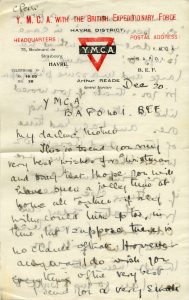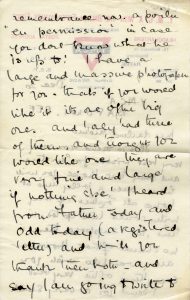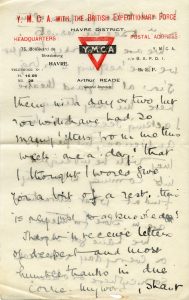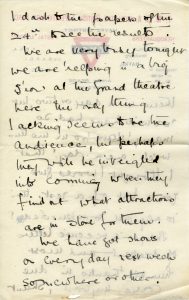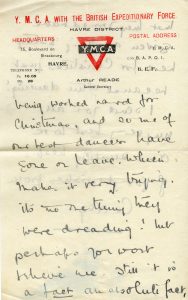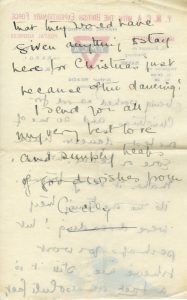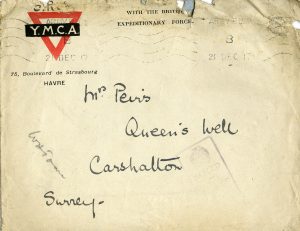Transcription
BAPO no. 1. B. E. F.
This is to send you my
very best wishes for Christmas
and say that I hope you will
have such a jolly time at
home all together, if only
Willy could turn up too, in
time, but I suppose there is
no chance of that. However
anyway I do wish you
everything of the very best.
I send you a very small
[page]
remembrance now, a poilu
“eu permission” in case
for Lord knows what he
is up to! I have a
large and massive photograph
for you – that’s if you would
like it. its one of the big
ones and I only had two
of them, and thought you
would like one. They are
very fine and large
if nothing else! I heard
from Father today and
Odd today (a registered
letter) and will you
thank them both – and
say I am going to write to
[page]
them in a day or two, but
you will have had so
many letters from me this
week one a day! that
I thought I would give
for a bit of a rest. This
is only just to acknowledge!
They will receive letters
of deepest and most
humble thanks in due
course. My word, shall
[page]
I dash to the papers of the
24th to see the results.
We are very busy tonight.
We are helping in a big
show at the grand theatre
here, the only thing
lacking seems to be the
audience, but perhaps
they will be inveigled
into coming when they
find out what attractions
are in store for them.
We have got shows
on every day next week
somewhere or other,
[page]
being worked hard for
Christmas, and some of
our best dancers have
gone on leave, which
makes it very trying.
it’s not the thing they
were dreading! but
perhaps you would
believe me. Still it is
a fact an absolute fact,
[page]
that they would have
given anything to stay
here for Christmas just
because of the dancing!
I send for all
my very best love
and simply heaps
of good wishes yours
Cecily.
Commentary
As Christmas 1917 drew near, Jack Peirs was preparing to spend the holiday at home in Carshalton for the first time since 1914. Since the beginning of December, he’d been at the Senior Officers’ School in Aldershot, and the close proximity allowed him to make regular visits to his family, heading home for dinners, avoiding bridge games, and finally meeting his goddaughter, who was born over the summer. But as the Peirs family prepared to welcome their only son home for the holidays, they undoubtedly missed the presence of their daughter Cecily.
he oldest of the four Peirs siblings, Cecily was a professionally trained singer who studied at the Royal Academy of Music in London. During the First World War, she volunteered with the Red Cross and YMCA, touring England and later France to perform in the variety shows and musicals intended to offer entertainment and benign distraction to soldiers at the front. As indicated by her stationery letterhead, Cecily was spending Christmas near Le Havre in Normandy, about 250 kilometers from the 8th Queens, who were in divisional reserve at Vraignes-en-Vermandois.
At face value, Cecily’s letter to her mother evokes a big personality. Her writing is full of intensifiers and superlatives, combined in an effusive style that seems oratory, as if the letter was written to be read aloud. Its author jumps rapidly from topic to topic, even though she’s writing “only just to acknowledge,” and she uses almost more exclamation points in one letter than her brother does in 271. Where he typically closes with “love to all,” she outdoes him tenfold, sending “for all my very best love and simply heaps of good wishes.” Visually, Cecily’s script sprawls broadly across the paper, and like Jack she seems to fit relatively few words on each page.
The reader of this letter is confronted with a deep and missing context. It is full of in-jokes and references, suggesting both a close relationship and a regular, nearly daily correspondence between mother and daughter. The collection at large provides a few clues: “Willy” is Gladys’s husband William, also on active service and away from Queen’s Well for the holidays, and we can gather from Cecily’s volunteering history that by December 1917 she was reasonably experienced in this kind of work. However, her letter fails to answer most of the questions it raises – what was the “small remembrance” she sent, and just what was the soldier she mentioned up to? Why was she dashing to the papers on the 24th, and what were the results she found there? And what was the thing the other YMCA volunteers seem to have been dreading? Perhaps more letters from Cecily would provide answers to these questions.
Regardless, this one helps us to draw a few conclusions. Cecily seems to have been dedicated to her work, enough so that she chose to remain in France for Christmas when she likely could have gotten leave if she had really wanted to. Like her brother, she is anxious to put on a good face in writing to her family, making the best out of a less than ideal situation as Jack does time and again. Her letter provides an example of how the war changed things for the Peirses, trading a brother for a sister, at least temporarily, as the conflict entered its fourth year.

